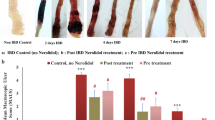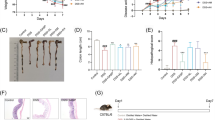Abstract
The aim of this study was to evaluate the antiinflammatory activity of ethanol extracts from chaga mushroom (Inonotus obliquus, IOE) grown on germinated brown rice. A total of 35 male BALB/c mice were divided into 5 treatment groups and given a commercial diet (A), IOE administration (B), dextran sodium sulfate (DSS) treatment to induce colitis (C), IOE administration+DSSinduced colitis (D), and sulfasalazine administration+ DSS-induced colitis (E). IOE treatment (D) decreased the expression of tumor necrosis factor (TNF)-α, cyclooxygenase (COX)-2, interleukin (IL)-4, interferon (IFN)-γ, signal transducers and activators of transcription (STAT)1, and STAT6 and showed lower levels of immunoglobulin (Ig)E and IgA in the spleen and mesenteric lymph node (MLN) compared to those of the DSS-induced colitis group (C). In addition, IOE suppressed the DSS-induced colonic tissue destruction. Therefore, our data strongly suggests that IOE could be a potent anti-inflammatory agent.
Similar content being viewed by others
References
Fiocchi C. Inflammatory bowel disease: Etiology and pathogenesis. Gastroenterology 115: 182–205 (1998)
Kaser A, Zeissig S, Blumberg RS. Inflammatory bowel disease. Annu. Rev. Immunol. 28: 573–621 (2010)
Baumgart DC, Sandborn WJ. Inflammatory bowel disease: Clinical aspects and established and evolving therapies. Lancet 369: 1641–1657 (2007)
Peppercorn MA. Sulfasalazine. Pharmacology, clinical use, toxicity, and related new drug development. Ann. Intern. Med. 101: 377–386 (1984)
Kim YO, Park HW, Kim JH, Lee Y, Moon SH, Shin CS. Anticancer effect and structural haracterization of endo-polysaccharide from cultivated mycelia of Inonotus obliquus. Life Sci. 79: 72–80 (2006)
Aruoma OI. Free radicals, oxidative stress, and antioxidants in human health and disease. J. Am. Oil. Chem. Soc. 75: 199–212 (1998)
Park YK, Lee HB, Jeon EJ, Jung HU, Kang MH. Chaga mushroom extract inhibits oxidative DNA damage in human lymphocytes as assessed by comet assay. BioFactors 21: 109–112 (2004)
Hwang Y, Noh G, Kim S. Effect of Inonotus obliquus extracts on proliferation and caspase-3 activity in human gastro-intestinal cancer cell lines. J. Life Sci. 36: 18–23 (2007)
Jeon TI, Hwang SG, Lim BO, Park DK. Extracts of Phellinus linteus grown on germinated brown rice suppress liver damage induced by carbon tetrachloride in rats. Biotechnol. Lett. 25: 2093–2096 (2003)
Lim BO, Jeon T, Hwang SG, Moon JH, Park DK. Phellinus linteus grown on germinated brown rice suppresses IgE production by the modulation of Th1/Th2 balance in murine mesenteric lymph node lymphocytes. Biotechnol. Lett. 27: 613–617 (2005)
Lim BO, Yamada K, Cho BG, Jeon T, Hwang SG, Park T, Kang SA, Park DK. Comparative study on the modulation of IgE and cytokine production by Phellinus linteus grown on germinated brown rice, Phellinus linteus and germinated brown rice in murine splenocytes. Biosci. Biotech. Bioch. 68: 2391–2394 (2004)
Lelono RAA, Tachibana S, Itoh K. Isolation of antifungal compounds from Gardenia jasminoides. Pak. J. Biol Sci. 12: 949–956 (2009)
Cooper HS, Murthy SNS, Shah RS, Sedergran DJ. Clinicopathologic study of dextran sulfate sodium experimental murine colitis. Lab. Invest. 69: 238–249 (1993)
Bjoërck S, Jennische E, Dahlström A, Ahlman H. Influence of topical rectal application of drugs on dextran sulfate-induced colitis in rats. Digest. Dis. Sci. 42: 824–832 (1997)
Wirtz S, Neurath MF. Mouse models of inflammatory bowel disease. Adv. Drug. Deliver. Rev. 59: 1073–1083 (2007)
Zenewicz LA, Antov A, Flavell RA. CD4 T-cell differentiation and inflammatory bowel disease. Trends Mol. Med. 15: 199–207 (2009)
Holdstock G, Ershler WB, Krawitt EL. Defective lymphocyte IgA production in inflammatory bowel disease. Clin. Immunol. Immunop. 24: 47–54 (1982)
Sampson HA, Metclafe DD. Food allergies. J. Am. Med. Assoc. 268: 2840–2844 (1992)
Kang OH, Kim DK, Choi YA, Park HJ, Tae J, Kang CS, Choi SC, Nah YH, Lee HK, Lee YM. Suppressive effect of nonanaphylactogenic anti-IgE antibody on the development of dextran sulfate sodium-induced colitis. Int. J. Mol. Med. 18: 893–899 (2006)
Murch SH, Lamkin VA, Savage MO, Walker-Smith JA, Macdonald TT. Serum concentrations of tumour necrosis factor α in childhood chronic inflammatory bowel disease. Gut 3 32: 913–917 (1991)
Park YM, Won JH, Kim YH, Choi JW, Park HJ, Lee KT. In vivo and in vitro anti-inflammatory and anti-nociceptive effects of the methanol extract of Inonotus obliquus. J. Ethnopharmacol. 101: 120–128 (2005)
Wan YY. Multi-tasking of helper T cells. Immunology 130: 166–171 (2010)
Forbes E, Panhuys NV, Min B, Gros GL. Differential requirements for IL-4/STAT6 signalling in CD4 T-cell fate determination and Th2-immune effector responses. Immunol. Cell Biol. 88: 240–243 (2010)
Dieleman LA, Palmen MJHJ, Akol H, Bloemena E, Pen AS, Meuwissen ASGM, Van Rees EP. Chronic experimental colitis induced by dextran sulphate sodium (DSS) is characterized by Th1 and Th2 cytokines. Clin. Exp. Immunol. 114: 385–391 (1998)
Author information
Authors and Affiliations
Corresponding author
Rights and permissions
About this article
Cite this article
Debnath, T., Hasnat, M.A., Pervin, M. et al. Chaga mushroom (Inonotus obliquus) grown on germinated brown rice suppresses inflammation associated with colitis in mice. Food Sci Biotechnol 21, 1235–1241 (2012). https://doi.org/10.1007/s10068-012-0162-6
Received:
Revised:
Accepted:
Published:
Issue Date:
DOI: https://doi.org/10.1007/s10068-012-0162-6




